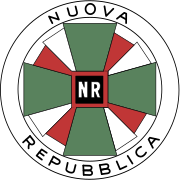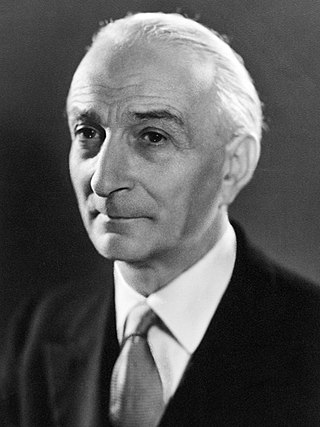
Antonio Segni was an Italian politician and statesman who served as President of Italy from 1962 to 1964, and as Prime Minister of Italy in from 1955 to 1957 and again from 1959 to 1960.

Alcide Amedeo Francesco De Gasperi was an Italian politician and statesman who founded the Christian Democracy party and served as prime minister of Italy in eight successive coalition governments from 1945 to 1953.
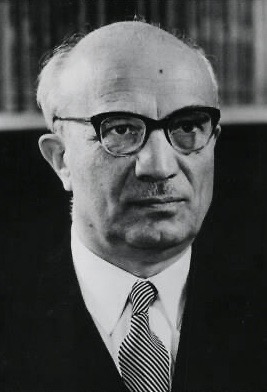
Amintore Fanfani was an Italian politician and statesman, who served as 32nd prime minister of Italy for five separate terms. He was one of the best-known Italian politicians after the Second World War and a historical figure of the left-wing faction of Christian Democracy. He is also considered one of the founders of the modern Italian centre-left.

Luigi Longo, also known as Gallo, was an Italian communist politician and general secretary of the Italian Communist Party from 1964 to 1972. He was also the first foreigner to be awarded an Order of Lenin.
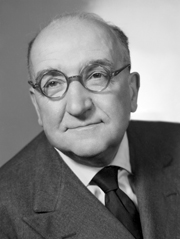
Adone Alvaro Ugo Natale Camillo Zoli was an Italian politician who served as the 35th prime minister of Italy from May 1957 to July 1958; he was the first senator to have ever held the office.
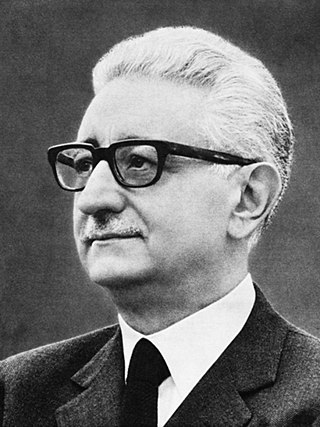
Giovanni Leone was an Italian politician, jurist and university professor who was President of Italy from 1971 to 1978. A founding member of Christian Democracy (DC), Leone briefly served as Prime Minister of Italy from June to December 1963 and again from June to December 1968. He was also President of the Chamber of Deputies from 1955 to 1963.

The Italian Republican Party is a political party in Italy established in 1895, which makes it the oldest political party still active in the country. The PRI identifies with 19th-century classical radicalism, as well as Mazzinianism, and its modern incarnation is associated with liberalism, social liberalism, and centrism. The PRI has old roots and a long history that began with a left-wing position, being the heir of the Historical Far Left and claiming descent from the political thought of Giuseppe Mazzini and Giuseppe Garibaldi. With the rise of the Italian Communist Party and the Italian Socialist Party (PSI) to its left, it was associated with centre-left politics. The early PRI was also known for its anti-clerical, anti-monarchist, republican, and later anti-fascist stances. While maintaining those traits, during the second half of the 20th century the party moved towards the centre on the left–right political spectrum, becoming increasingly economically liberal.
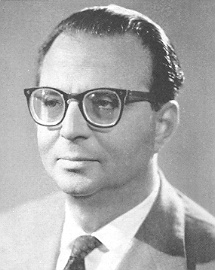
Ugo La Malfa was an Italian politician and an important leader of the Italian Republican Party.

The Democratic Party is a social democratic political party in Italy. The party's secretary is Elly Schlein, elected in the 2023 leadership election, while the party's president is Stefano Bonaccini.

Raffaele Cadorna Jr. was an Italian military officer who fought during World War I and World War II. He is best known for being one of the commanders of the Italian Resistance against German occupying forces in northern Italy after 1943.

The Garibaldi Battalion was a largely-Italian volunteer unit of the International Brigades that fought on the Republican side of the Spanish Civil War from October 1936 to 1938. It was named after Giuseppe Garibaldi, an Italian military and political figure of the nineteenth century.
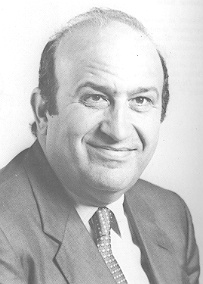
Vittorio Sbardella was an Italian politician, who was a member of the Italian Chamber of Deputies for Democrazia Cristiana from 1987 until few months before his death. He was nicknamed Lo Squalo.

Randolfo Pacciardi was an Italian politician.

Democratic Centre is a centrist, Christian leftist and social-liberal political party in Italy. Most of its members, including its leader Bruno Tabacci, are former Christian Democrats. Since its beginnings, the CD has been also part of the centre-left coalition, centred around the Democratic Party (PD).

Ivan Matteo Lombardo was an Italian politician.
The Mazzini Society was an antifascist political association, formed on a democratic and republican basis, situating itself within the tradition of the Risorgimento, and created in the United States by Italian-American immigrants in the late 1930s. It was named after Giuseppe Mazzini, a leading figure of Italian reunification in the mid-19th century, who had worked from exile.

Italia Viva is a liberal political party in Italy founded in September 2019. The party is led by Matteo Renzi, a former Prime Minister of Italy and former secretary of the Democratic Party (PD). As of 2021, Italia Viva is a member of the European Democratic Party.
Oliviero Zuccarini was an Italian political journalist and Republican Party official and activist. He was arrested for antifascist activities in 1926, and though he was soon released he remained under close police surveillance. He continued to live in Rome, but kept a very low profile till after the fall of fascism. In 1946, however, he was elected a member of parliament. In the light of his background and record before 1926 he might have been expected to emerge as a leading Republican Party figure in the Chamber of Deputies, but as matters turned out he quickly became marginalised within the party, remaining a member of parliament for fewer than two years.
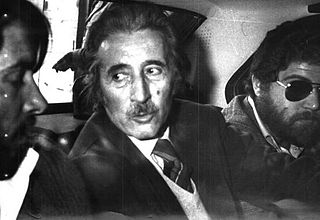
The White coup was a planned coup in Italy intended for the summer of 1974, promoted by former anti-fascist and anti-communist partisans. It intended to force the then President of the Republic Giovanni Leone to appoint a government that would proscribe the Italian Communist Party, other communist groups and right-wing groups like the Movimento Sociale Italiano. It would then lead institutional reforms and establish a semi-presidential constitution like that of the Fifth Republic in France. The term "white coup" (alternatively "silent coup" or "soft coup" then entered the common language to indicate more generally a coup d'état carried out without recourse to force, by a government that exercises power unconstitutionally.
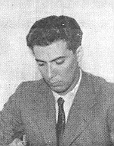
Fabio De Felice was an Italian politician. A member of the Italian Social Movement (MSI) and the Monarchist National Party, he served in the Chamber of Deputies from 1953 to 1958.
